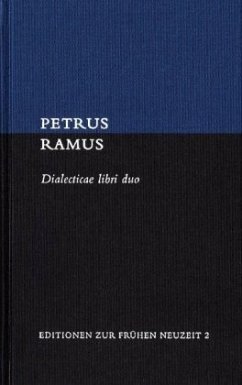Die Ausgabe der 'Dialecticae libri duo' von 1572 ist das letzte und wirkungsmächtigste Werk des Petrus Ramus. Es führt - in der Tradition Agricolas - in die ciceronianische Topik ein und reflektiert, inwieweit eine systematische Anleitung zur Urteilsfindung möglich ist. Der Rückgriff auf die literarischen Klassiker (Vergil, Ovid und Cicero) markiert bereits stilistisch die Abgrenzung zur scholastischen Tradition. Ramus greift zwar formale Elemente der aristotelischen Logik auf, behandelt diese aber mit einer speziellen Methode, die den Ramismus im 16. und 17. Jahrhundert zu der Gegenkonzeption aristotelischer Schulphilosophie werden lässt. Die vorliegende Edition macht diesen zentralen Text des Ramismus - zusammen mit einer neuen Übersetzung und Einleitung - wieder greifbar.
»Angesichts der erstaunlichen Wirkung des Denkens von Ramus ist es [...] für jede Beschäftigung mit den geistigen Konstellationen der Frühen Neuzeit unabdingbar, sich ein wenn auch nur vorläufiges Bild von Ramus' Denkweise zu machen. Dazu bietet die vorliegende Ausgabe der Dialektik in zwei Büchern reichlich Anschauungsmaterial. [...] Indem der Text sowohl im Original wie in Übersetzung geboten wird, fühlt sich hoffentlich auch der eine oder andere Leser ermutigt, sich mit Hilfe der Übersetzung auch durch den lateinischen Text zu arbeiten.« Till Kinzel, Informationsmittel für Bibliotheken »Es ist jedenfalls ein philosophiehistorisch eminent wichtiger Text, der mit dieser Ausgabe im Rahmen der neuen Editionsreihe 'Editionen zur Frühen Neuzeit' - mit einem exzeptionell eleganten Buchdesign, erwähnen wir das auch noch - wieder zugänglich ist.« Claus A. Andersen, Philosophisches Jahrbuch

